#derrida joke
Explore tagged Tumblr posts
Text

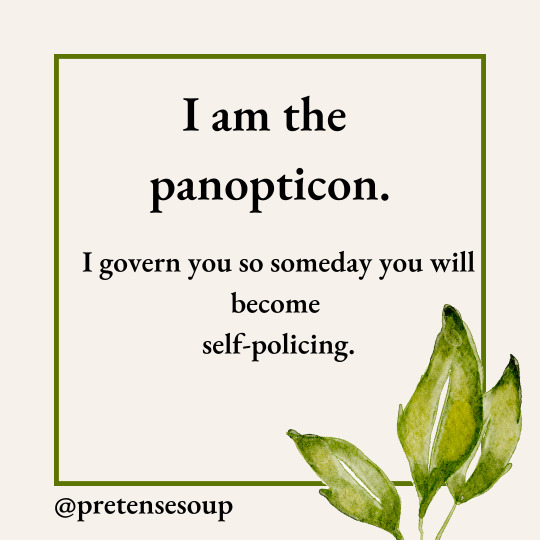

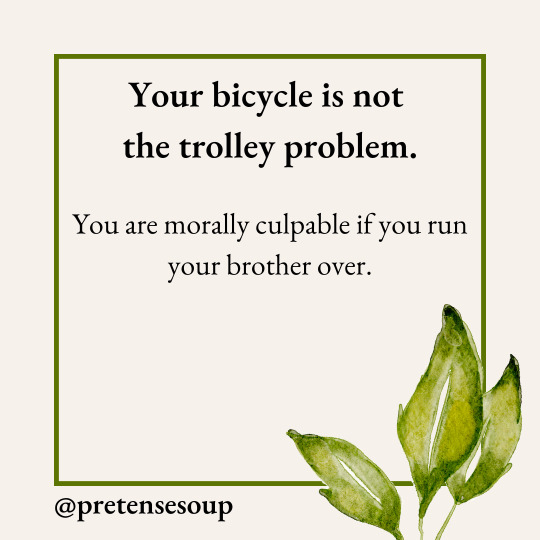
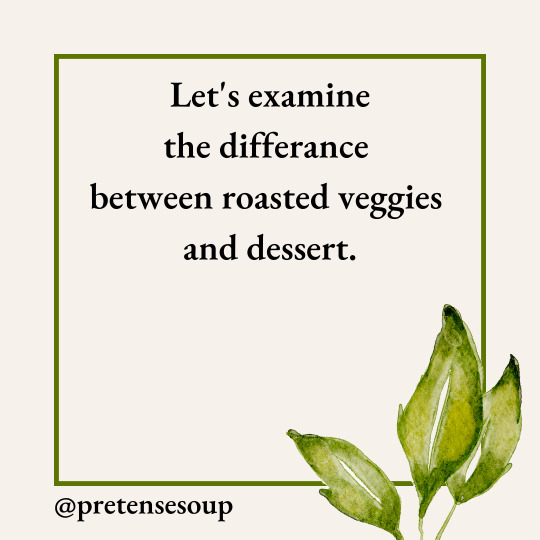
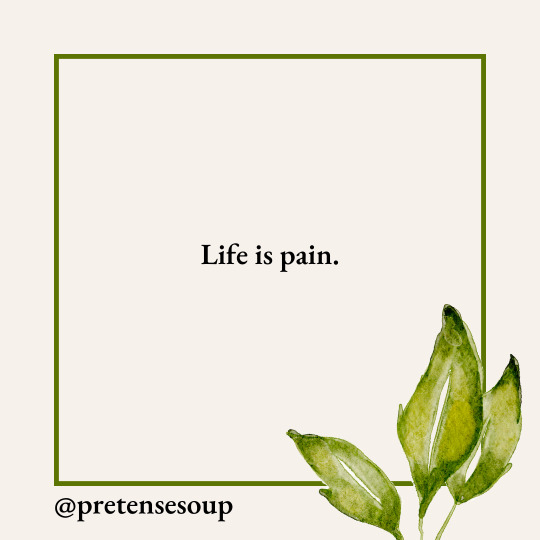
Bringing my shtick over here. I realize that the intersection of these two circles is approximately ten people and I know them all.
[ID: Six slides with three green leaves in the corner and an @pretensesoup watermark. Slide one: Things I have told my children because I studied philosophy. Slide 2: I am the panopticon. I govern you so someday you will become self-policing. Slide 3: If one stuffy always tells the truth and the other always lies...What would Barktrand Russell say if I asked if you'd brushed your teeth? Slide 4: Your bicycle is not the trolley problem. You are morally culpable if you run your brother over. Slide 5: Let's examine the differance between roasted veggies and dessert. Slide 6: Life is pain.]
#foucault joke#derrida joke#philippa foote joke#we do have a stuffed dog named barktrand russell in the house#seneca joke#princess bride joke#philosophy joke#parenting joke#parenting philosophy#i forgot to do marx#next time
1 note
·
View note
Text
I need to learn more things so I can joke about them
#want to be one of those philosophy ppl that joke about Derrida and Kneetchie#I want to feel smart! I want to be in on the joke omg!!
4 notes
·
View notes
Text
someone wrote size difference as size différance and now I'm being made to imagine someone either trying to apply deconstructive philosophy to a size kink or just a really small fem version of Derrida
Or maybe it's actually just the opposite of those things
0 notes
Text
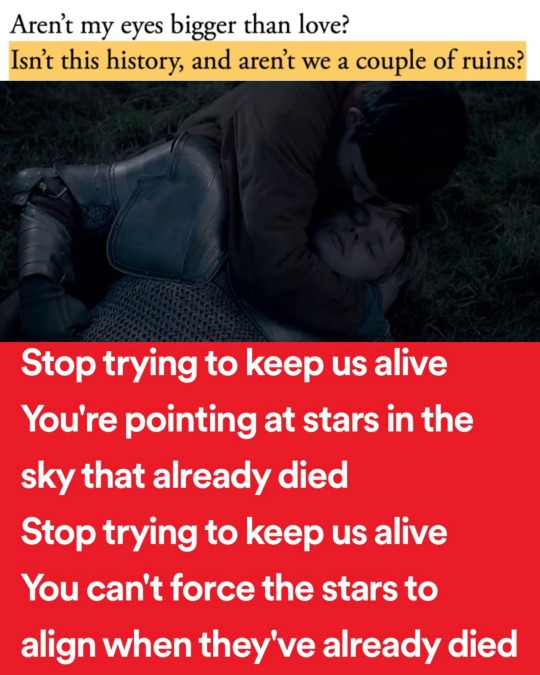


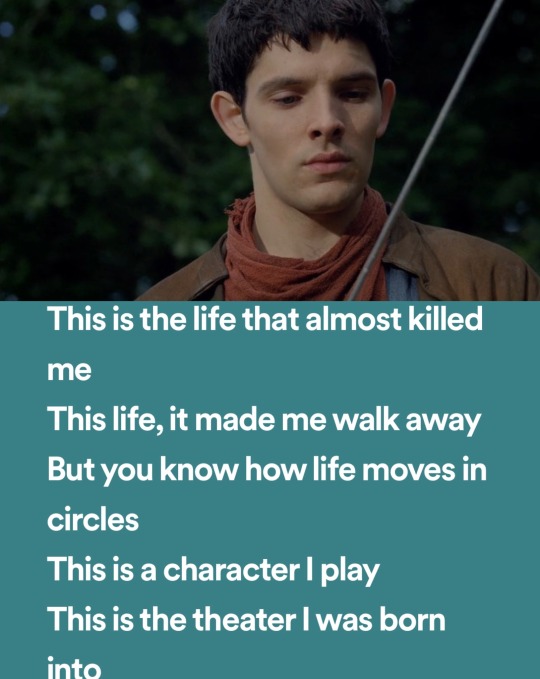
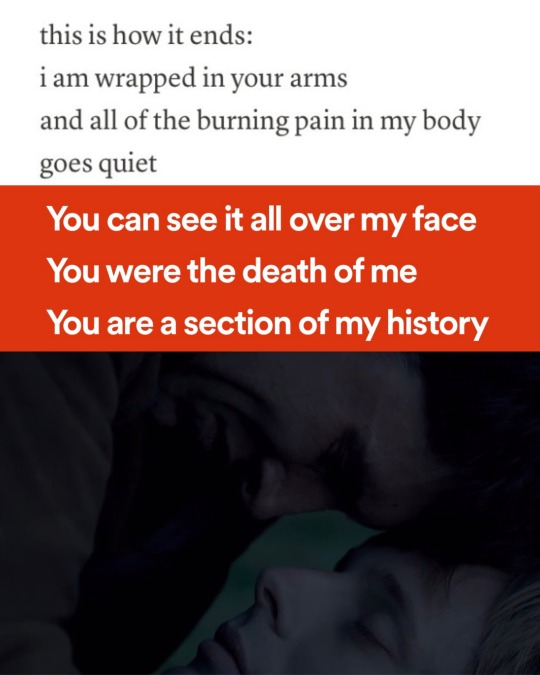
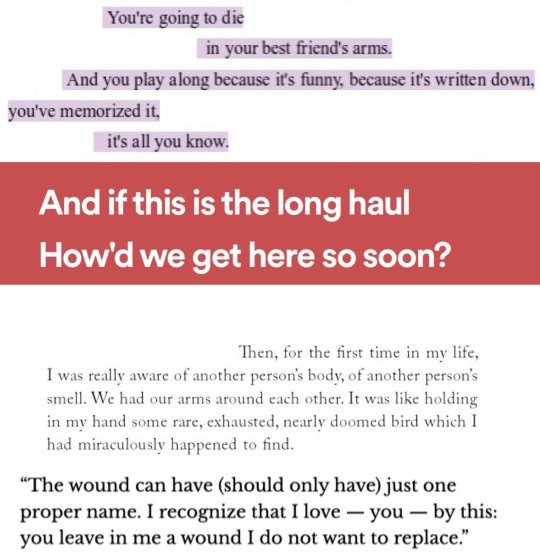
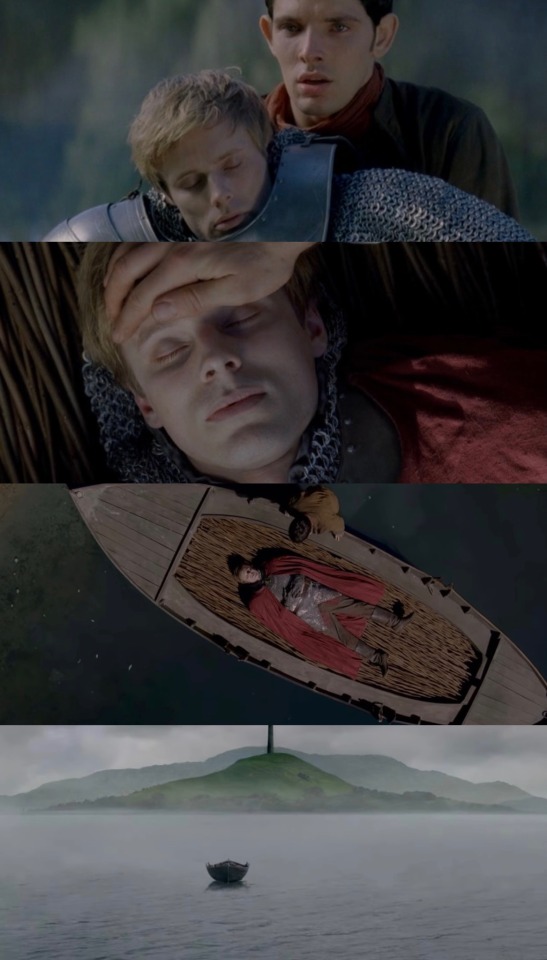


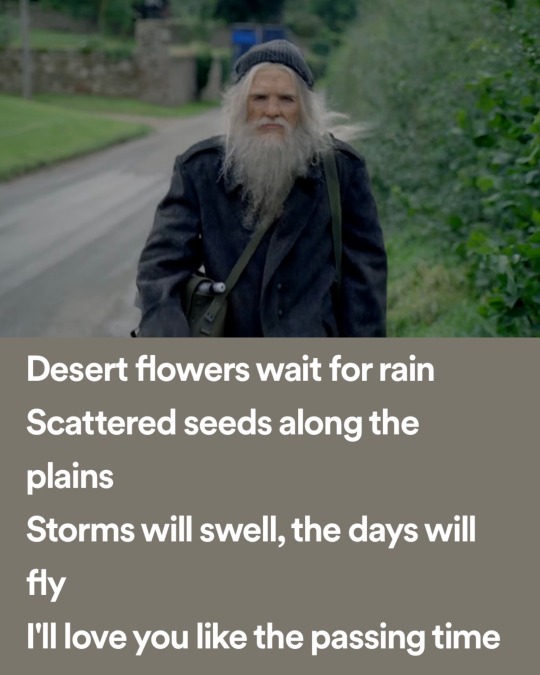
the doomed narrative of merlin and arthur
[in love with you - kenneth koch / astronomy - conan gray / something great - one direction / heartache on the big screen - five seconds of summer / not joking - the front bottoms / “bloodwater”, gravecleaner (2020) / skeleton boy - neon trees / crush - richard silken / coney island - taylor swift ft. the national / giovanni’s room - james baldwin / the post card: from socrates to freud and beyond - jacques derrida / ??? / the story - brandi carlile / terlingua - gregory alan isakov]
#merlin#merthur#bbc merlin#bbc merthur#webweaving#web weaving#merlin 5x13#diamond of the day#arthur pendragon#merlin emrys#emrys#taylor swift#one direction#five seconds of summer#richard siken#gregory alan isakov#the front bottoms#conan gray#words#typography#merlin edit#merlinedit#quotes#lyrics
172 notes
·
View notes
Text
Detective Pony
I recently received an ask from @querimoniousqueer about whether I had ever read Detective Pony by sonnetstuck. I hadn’t, but decided I should, so I read it over the past week.
Going in I knew almost nothing about it beyond the joke in Homestuck proper, in which Dirk sends Jane a vandalized copy of a Pony Pals book with substitutions made to the text for comic effect. The Detective Pony fanfic extrapolates off that premise and provides a Dirk-ified version of the entire novella.
At first I wasn’t particularly sold on the premise. Revisiting the story’s first page (which Hussie himself created in Homestuck), it’s actually not that funny. At the beginning of Act 6 Hussie took the opportunity of the new universe to update the in-universe date from April 13, 2009 to November 11, 2011. This is not a particularly long stretch of time but to emphasize this shift Hussie decided to throw in several references to what is, I assume, the singular piece of new media he had consumed during that period: the sitcom Parks and Recreation.
I’m not sure how hilarious Hussie thought it was to change a supporting character’s name to Pawnee Township, Indiana, the fictional setting of Parks and Recreation, but in 2023 the reference feels phenomenally dated, without the self-awareness of the intentionally dated references to Con Air elsewhere in the comic. Though the reference is a bit more interesting metafictionally (does Dirk, living in post-apocalyptic future Earth, intend to make a reference to a work popular in 2011, making it contemporaneous and thus relevant to Jane?), now that the audience of Homestuck is no longer themselves contemporaneous to Jane it’s hard to even crack a smile beyond the simple audaciousness of the premise.
As Detective Pony (the fanfic) continues, it quickly grows dull. In Homestuck, the joke is fairly short and works because of its aforementioned audaciousness, so seeing a subsequent 20-30 pages of what is basically the same idea repeated over and over (everyone swears, everyone is violent, the cat is Satanic, plus a few non sequitur references) wore me down pretty quickly.
Fortunately, the fanfic has some major cards to play.
The first longform philosophical digression on the corruption of lolcat memes grabbed my interest, and as the story goes on, an entirely new metafictional narrative emerges in which Dirk, the cynical and too-smart-for-his-own-good authorial figure, comes into conflict with the more earnest and sincere characters (and original author) of Pony Pals. A dichotomy is established between the intellectually probing but ironically detached nature of one authorial voice and the childish but emotionally honest nature of the other. The authorial voices begin to wage war against each other, with Dirk’s orange-texted narrative attempting to cover up the black-texted narrative of the other voices, leading to a complex series of machinations and an eventual exposing of Dirk’s bitter loneliness and self-doubt.
This all sounds rather familiar.
Indeed, halfway through this fic, I had to scroll to the top and check the date it was posted. October 14, 2014. Predating Homestuck’s Epilogues by roughly five years.
I find it difficult to believe that Hussie or his Epilogue co-authors had not read Detective Pony prior to writing the Epilogues. The thematic overlap is immense, let alone the explicit plot and metatextual elements, let alone the fact that all of those elements revolve specifically around Dirk. That’s not to say the two works are identical. Detective Pony leans far more heavily onto its author’s extensive knowledge of Western literature and philosophy (including significant references to Derrida, Dante, Plato, Socrates, and others), while the Epilogues aggrandize the scope of stakes of the plot and weave in a far wider amount of character threads.
I’d recommend Detective Pony to anyone still confused or potentially even hurt by the Epilogues; the “character assassination” done in Detective Pony is done to characters from a story about ponies for little girls as opposed to your beloved Homestuck characters, so it might be much easier to approach, grapple with, and understand the themes of the Epilogues without the large amount of emotional baggage characters like Jane, Jake, Jade, Dave, and so on carry with them. It might shed more insight on what Hussie and his co-authors were attempting with the Epilogues, though you might also find it a bit dull if you’re not familiar with Derrida or the other frequently-quoted philosophers within the text. I’m not a philosophy person myself (way more of a classical fiction junkie), but still I was able to follow along and enjoy it.
41 notes
·
View notes
Text
On the Endless and Their Aspects
I’ve been discussing the Endless a lot with people lately, and it’s gotten me to pull out two facts from the comics that are never explicitly stated, or are stated so fleetingly that it’s easy to miss their actual impact. I say “facts” and not “theories” or “headcanons” despite this, because I think the evidence for the validity of these is clear enough that it’s more a matter of pulling out what canon shows us but doesn’t shove under our noses screaming “LOOK AT THIS COOL THING” than it is attempting to connect the dots on a bunch of disparate canon moments in some coherent way. There will be spoilers for the Sandman comics in this.
The first fact is that each Endless is not only the personification/embodiment of their own aspect, but also the force that defines their opposite concept. We see this clearly with four of the seven, I think, and then it’s up to speculation with the other three, but with 4 being shown so clearly it’s safe to say that they all work this way.
Destiny defines free will. We see this in the branched paths of his garden, constant choices for the walker to make, and in the implication that even he may not know which path a walker will choose. We also see this near the end of The Kindly Ones, when Destiny is suddenly confronted by an untold number of alternate versions of himself, which then gradually disappear as the other characters make their choices. Not even Destiny knows which of them is the “true” version. It is, in all truth, possible to read this as suggesting that destiny itself has fractured and become unstable because of the exact nature of the events, but I think a more plausible reading is that these alternates always exist, all unaware of each other, and events merely caused them to become visible to one another temporarily. (Also I will stop to point out here that Destiny is distinct from Fate in the Sandman cosmology.)
Death defines birth. She’s the one Endless we see directly engage with the duality, because she’s present at birth as well as at death. That’s actually what tipped me off to look at them as potentially really being composed of pairs of opposed concepts rather than a single idea/state.
Dream defines reality. We actually do see this in action as well, when a critical mass of dreamers recreate the universe in the image of their dreams. This is also part of why the Vortices are such an existential threat to the world. Destroy dreams and you no longer have an anchor for reality.
Destruction defines construction. (Not creation, some things that are created cannot be destroyed.) Destruction doesn’t seem to realize this himself, but he also says it outright when he describes his realm as full of entities constantly building things to destroy. (There is possibly a joke about Derrida’s theory of deconstruction here, especially because deconstruction rests on the concept of exposing internal oppositions and contradictions, and also denies that any text can ever contain a single meaning, which is very like what I’m currently arguing is true of the Endless themselves.)
Now for the three that aren’t so explicit in the text:
Desire defines indifference, I would guess, and Despair defines hope. What’s interesting about that assumption is that the twins each closely relate to each other’s opposites. To be capable of desire or wanting presupposes the ability to hope for something, and Despair rests on the fundamental indifference of those who have lost the ability to want anything better. In that sense they define each other, which is what makes them twins.
I assume that Delirium’s opposite is Delight, but I’m not sure of that. It would be interesting if that were true, though, because it would suggest the possibility that any of the Endless might be able to change and embody their opposite the same way she did.
Part two of this is closely related to this, because it again rests on the fact that they are fundamentally indistinguishable from their aspects. When Death walks among us, death walks among us. There’s no separating them from what they are. This rests mostly on something Delirium says in Destruction’s chapter of Endless Nights, which is that the strange future artifacts are there because Delirium and Destruction are there. And of course, their presence makes no logical sense, and everything they find foretells destruction. They exist because the presence of Delirium and Destruction influences the world around them, because their names are literal. We also see it throughout Brief Lives, where throughout Dream and Delirium’s search for Destruction, not only is destruction constantly around them, but also in order to find him, Dream at last sets himself inevitably on the path to his own end, but also his own emotional devastation. He’s arguably destroyed before he dies.
Having said that, what does that seem to mean for Dream’s presence in the waking world? Because he doesn’t seem to carry dream-logic with him or anything as obvious as that. But he is also the Prince of Stories, and he could be argued to carry narrative with him, such that people around him, who would otherwise be ordinary people, become enmeshed in capital-s Stories with clear narrative roles. It is even possible that this is a major force behind the constant failure of his love affairs, because a grand passion is a very good story, but those stories are very difficult to live in for any great length of time. And to make matters worse, Dream himself says, at the very end of the series but also hundreds of years before the climax, that he “[has] no story of [his] own, nor may [he] ever.” It’s impossible to be caught up in a grand romance plot with a being who cannot also participate in that plot. It’s absolutely doomed. Arguably, the only way to co-exist with Dream for any length of time is to have a part in a narrative that makes that coexistence possible. (Arguably, for example, this is one of the things Death does with Hob: she doesn’t just make him immortal, she arranges a story that will allow him to continue to be who and what he is without Dream’s existence in his life taking it over with some other narrative.)
96 notes
·
View notes
Text
I wish Derrida was around to develop theories of the inside joke
3 notes
·
View notes
Note
Nah, Gale's a leftcom or an academic leftist. He spent that year in his tower reading nothing but Bordiga and Derrida.
mystra gave him like 5th dimensional communist theory so he literally holds the view people make jokes about adorno believing he thinks water is fascist
8 notes
·
View notes
Text
on grief, memory, and archive:
"There was a time when fragments would come spilling out of me a few sips into the first beer. The fact that this specific bottle I had chosen—Newcastle Brown Ale—reminded me of him. The fact that I was drinking at all. The fact that I had a tendency to disappear, to take friendship too seriously sometimes or not seriously at all most of the time. That my mood depended on the proximity to summertime, the feeling of the afternoon sun, the sound of a distant melody coming from a stranger's window. That this is why I still smoked, because I admired the way that smoke evaporated into the air, aimless and ephemeral.
The fact that in those early years, when our faces hadn't changed, I could picture Ken turning twenty-one, sitting in a lecture hall, graduating from college with a sensible haircut. Living in Boston, enrolled in law school, selling concessions at Fenway Park, as one of his many dreams used to go. The fact that I was a writer at all. A way to loot and hoard in a city on fire, to impose structure on chaos, to download the contents of a storage drive before it succumbed to corruption. Songs, notable T-shirts, and quotations from friends, written in the margins of my books. Taking a bar napkin to scribble down words, the dutiful, surviving half of an inside joke. I would tell you all this because it was my way of coping, of telling stories, of thinking that stories could build a bride over an abyss.
Maybe it was legacy, a way of bringing Ken into this moment, a spirit made real in the clink of two bottles, the magical appearance of a sad song in the air."
---
"I wrote him things that were crass and profane, silly and accusatory, broken and desperate, just to see if he could still read from a great distance. I told him about sex and confusion and how his mother broke my heart in her attempts to comfort me. At the end of each night, I wrote it all down, because I never wanted to forget any of it—the ache, the release, the flashes of euphoria when we were all laughing together. On some pages, I disguised my handwriting, seeing if my squiggles would lead somewhere continuous and unbroken. My handwriting changed that week, growing curvier and more ornate, like the violent fury of graffiti tags. I got lost while searching for the right words. What was that thing we had learned in our rhetoric class, about Derrida's 'deferral of meaning' and how words are merely signs that can never fully summon what they mean? Yet words are all we have, simultaneously bringing us closer, casting us father away."
---
"I obsessed over chronicling everything, noting all the atmospheric weirdness. In the margins of my journal, I drew a picture of the motel's trellis. I wrote as much as I could remember. Some of it was for future study, cryptic placeholder sentences about bygone times that felt too good for my present vocabulary. I wrote out of a sense of responsibility for our past."
– Hua Hsu, Stay True
2 notes
·
View notes
Text
I feel like all the cool philosophy shitposters make jokes about Lacan and Derrida and I somehow never got around to reading them. Then again I really don't think I have it in me to dig into more philosophy for the sake of dumb jokes so just like the posts and move on.
0 notes
Note
What kind of studies are you doing for a film career? If we wanted to follow the same path what should we do? I'm very interested in the topics you post about 💞
oh man. oh that's an interesting question nonnie. and one that is a little complicated to answer just because there's a lot of stuff that goes into it and I don't really think there's a set "path" for a lot of the kind of stuff that I learn about and what I hope to do in the future... which are kindof two very different things, but they have some interconnectedness here and there... it's kinda messy but I will do my best to explain:
So in terms of school stuff? currently I'm a Lit major with a minor in film and television studies- which at my school specifically there is a lot more of an emphasis on film THEORY than film PRODUCTION, and a lot of it overlaps with the english major just because the disciplines are so similar (so basically, even though I'm listed as a minor it might as well be a major). The difference between them is that theory is a lot more like literary studies, except rather than deep-analysis of a physical text, the thing you're analyzing is films, and taking into account everything within the moving image down to the form itself and how the director and productions designers use that form to create meaning that opens up readings of that film for us; the people who study them. Production of course rather focuses on making films themselves, and my school has some focus on this, but not an extraordinary amount. And honestly, if you want to get into the theory end of things, it doesn't really matter all too much what school you get into (whereas if you wanted to focus more on the production end of things there are definitely some better schools for this than others. and most of them are in california and disgustingly expensive and pretentious. and unfortunately I might try to go to one of them for grad school. like a fool. unless some other shit I want to try to do after I get out of here works out for me). I mean I stayed in-state for school and I really enjoyed the theory programs offered here for the most part (of course, there's no accounting for certain professors tastes. that's always going to be hit or miss- but I've still managed to find some really good ones that I like over the years) but honestly... it's not the only avenue for learning this kind of stuff. I mean once you have a foundation for it, and know what to look for, it becomes a lot easier to just... know how to do this stuff on your own. Like honestly, I feel like I have learned just as much about film out of class as I did in it. And to that end, here are my tips, and some stuff to watch/read to give you an idea of the kind of stuff I study
Slavoj Zizek's films are absolutely incredible. I actually met the guy through my program and yes: he is exactly like that in real life. But he's absolutely one of the must-watch film theory scholars/philosophers of this day and age, and anyone who has been in a film theory class knows about him. "The Pervert's Guide" films on cinema and Ideology are both quintessential film theory texts and very eye-opening, if not heavy-handed and very wordy.
Other philosophy and psychoanalysis that I've had to read a lot of include these three individuals more than any others: Lacan, Derrida, and Freud (specifically: on dreams, mourning and melancholia, and on jokes- because Freud isn't much use for real life person psychoanalysis, but as a theoretical framework for film characters he's pretty aces).
no film school is your best friend. This Article has basically all the jargon you really need to know to talk about film (weirdly the only thing I think is missing is high and low-key lighting, but honestly that stuff is very easy to find)
my best tip in terms of what to watch is: watch whatever you want, and watch everything. I've heard a lot of folks complain in my classes that they don't want to watch anything anymore outside of class because they have too much shit to watch for classes OR that film theory has ruined watching movies for them, but from my experience that's detrimental and kindof silly and weak-minded of them. To be perfectly honest film professors can assign as much niche stuff they like: and it can be good sometimes- and it IS good to reach out of your comfort zone and experience different directors, whether they be new or old, from your home country or from somewhere completely different, BUT none of the studying is really worth it unless you take it to what you're interested in and apply it there. because if there's anything I've learned in my time doing this is that there is ALWAYS some intentional film theory rigor available even in the shittiest movies imaginable. there is always something to talk about- whether it be how something was shot, or the cultural context that it exists in, and absolutely nothing in the world is too stupid and it can actually be REALLY fun to unpack when it is. it also helps a lot of this become second-nature and a lot less of a slog.
also any time you want I would happily give a list of some of the best films/directors I've watched for my film studies (especially in the last couple of years I think I've gathered up a great list of films from my favorite professors and ones that have been especially more memorable than some of the earlier stuff I had to sludge through) but that'll have to be a different post and a different ask because this thing is long enough and I'm tired 😂😂😂 But yeah. there you go. I hope this fuckin helps nonnie lmao
0 notes
Text
Ironic insider joke of Bernhard Bülow December 1897 „Mit einem Worte: wir wollen niemand in den Schatten stellen, aber wir verlangen auch unseren Platz an der Sonne."
=> The in social organisation of medieval Europe rooted analogies of sun and moon were amongst royals like Bülow well known metaphors:
the important lesson is that what might appear as "sun" (desires of shared life forces' causal relation, moral ideal) to you nowadays might be a "night" (psychotic mind constructs) you don't perceive until the devalued suffering💉☠️💉 of its attention shadows become more obvious, usually to future generations
=> reason of abominable Nazi sun symbol
(irony, "competition" for "a place in the sun" the european masses desired via their "hustle" dreams🌛🛐 via similar group-dynamics like 🔍burnout society Gary Vee)
counterbalancing the european colonialism whose globally competitive insanity Bülow previously hinted at via his distinct chosen vocabulary and grammar structure of the infamous German phrase quoted above.
If Bülow wouldn't have been aware of its sad irony of group dynamics, he would not have paired the phrase "mit einem worte" via the following contradiction of the introspective addition of "wir wollen niemanden in den Schatten🌛🛐🙈🙉🙊 stellen, aber..." in
“With one word: We do not want to put anyone into the shade, but we too demand our place in the sun.”
=> obviously, that phrase is the opposite (metacognition complexity) of the reductionistic "one word" he claimed it to be.
Likely it might have been dead serious sarcastic dry irony introspection, an silent longing for others to understand the moral dilemma he saw Europe to be in.
If not then he wouldn't have chosen such a fitting contradiction in combination with that sentence structure that in German culture is habitually used to express such nuanced self-critical introspection in relation to inter-group or inter-personal boundary setting
of shared "competitiveness" we tend to blindly chase "positively" like
ironic 🎶Nazis auf Speed - die Krupps
that within the in-group reinforcement similar like in current markets was perceived, dressed and disguised like 🎶we are veeFriends - veeFriends
🔍Measures of Men Lars Kraume = 📚The Politics of Care in Habermas and Derrida Between Measurability and Immeasurability
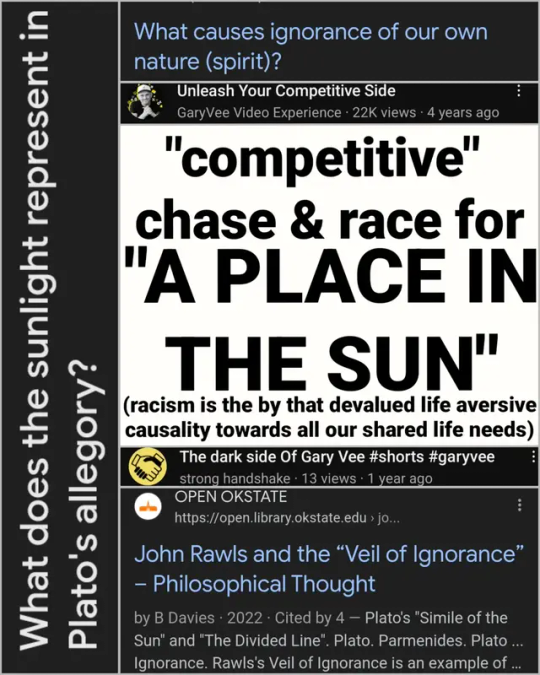


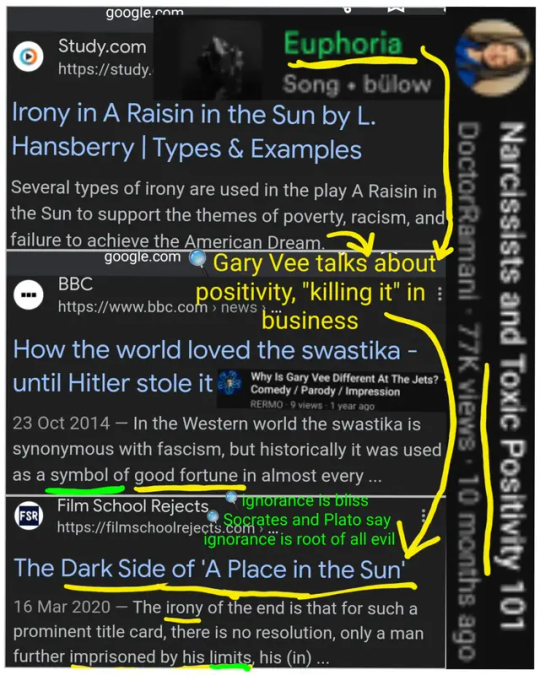






0 notes
Photo



Latest levels of laughter
After having some drinks and nice chats, you will level up to the next stage. The only way to reach it is by private elevator […][1] […] with inlaid marble floors and bas relief elevator doors,[2] constantly […] changing shape and function as it rotates,[3] looking like a Faberge egg because it’s the center of the empire.[4] Probably this center will also be the effect of these effects in a feedback loop, but it does not matter since everything depends cyclically on this center and its surroundings.[5] This elevation says the same thing again.[6] But […] as soon as an elevation is finished you must renew […] it; do that over and over.[7] The initial point assumes the same status as the terminal one.[8] Cracking feet-jokes or ones, that are out of order, Quentin Tarantino himself works here as a liftboy. I must confess: his elevator jokes really drive me up the wall. Mixing Martini - shaken, not stirred[9] he is making the elevation even more enjoyable. In the lift, I pressed "6," the button lit up with a bulb behind.[10] The elevator wall moved up, and with a lurch the elevator climbed.[11] It is an elevation,[12] […] but the elevation is obvious.[13] [...]One could enter the building, take the elevator, and arrive at […] whatever room, all on different floors.[14] While being elevated you´re not just able to enjoy the stunning view over Hongkong – no, you are also able to take a look inside the building, which is so weird and funny at the same time. Which of you has seen a young couple, happily married, on the morrow of their marriage?[15] People are taking cold showers. […] A wife tells her husband, “Hell no, I’m not cooking. It’s too hot. The kitchen is closed.” Men downing six packs of ice cold brew.[16] The aroma of oregano, tomato, and garlic filled the elevator.[17]
[1] Powers, The Overstory
[2] Fodors Travel, Fodors New York City 2015
[3] Koolhaas, Elements of Architecture
[4] Asimov, Complete Robot Anthology
[5] Serres, Crisis
[6] Serres, The Parasite
[7] Frankl, The Gothic
[8] Serres, Geometry
[9] James Bond in almost every movie
[10] Koolhaas, Elements of Architecture
[11] Asimov, Complete Robot Anthology
[12] Derrida, Signature
[13] Steiner, After Babel Aspects of Language and Translation
[14] Shane, Recombinant Urbanism
[15] Rousseau, Collected Works of Jean-Jacques Rousseau
[16] Goldsmith, Capital New York Capital of the 20th Century
[17] Goldsmith, Capital New York Capital of the 20th Century
0 notes
Text
youtube
If someone asks, I am in fact punsexual. (This is not a joke.)
Non-jokes aside, that got me thinking. I personally never met people
who dislike puns. But should the disdain for puns be widely spread, could it hinge on "the reassuring evidence within which Western tradition had to organize itself and must continue to live" that Derrida wrote about? ("Of Grammatology" p.19) The belief that the order of the signified is never contemporary, is at best the subtly discrepant inverse or parallel-discrepant by the time of a breath-from the order of the signifier. And the sign must be the unity of a heterogeneity, since the signified (sense or thing, noeme or reality) is not in itself a signifier.
A pun disrupts this notion, showing that no signifier, whatever its substance and form, has a "unique and singular reality"[.] A signifier is from the very beginning the possibility of its own repetition, of its own image or resemblance. It is the condition of its ideal ity, what identifies it as signifier, and makes it function as such, relating it to a signified which, for the same reasons, could never be a "unique and singular reality." From the moment that the sign appears, that is to say from the very beginning, there is no chance of encountering anywhere the purity of "reality," "unicity," "singularity". ("Of Grammatology" p.91)
And I'm horny for that shit. But I can guess why weak people would be annoyed by this. "No existential horror at the dinner table", I get it. Don't invite me.
0 notes
Text
i’m having another Moment™ where a part of what 🎶 talks about that we thought was not-technically-canon actually explains certain aspects of canon better than we thought, in retrospect
and i think i’m just “aaaa”-ing here because it’s just another matter of “everything i like is actually just the same thing”: everything is always about narratives and ghosts and poststructuralism etc. but i can’t “aaaa” about it on the Archive 81 sideblog because, again, teeechnically based mostly on 🎶’s own memories/understandings?
- ace
6 notes
·
View notes
Photo
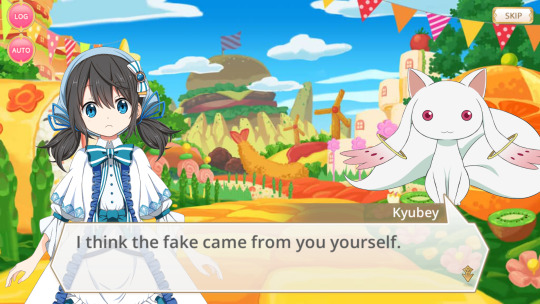
Not only is there no kingdom of difference but difference instigates the subversion of every kingdom.
#magia record#madoka#differance#derrida#bad dry academic jokes#poststructuralism#copies without originals#deconstruction
11 notes
·
View notes